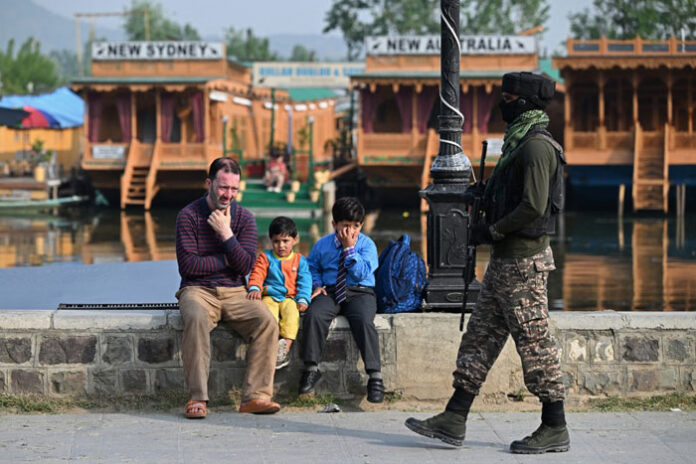MUZAFFARABAD, Pakistan – India and Pakistan exchanged heavy artillery along their contested frontier on Wednesday after New Delhi launched deadly missile strikes on its arch-rival, in the worst violence between the nuclear-armed neighbors in two decades.
At least 36 deaths were reported. Islamabad said 26 civilians were killed by the Indian strikes and firing along the border, while New Delhi said at least eight died from Pakistani shelling.
Moscow on Wednesday called for both India and Pakistan to show “restraint” after they exchanged heavy artillery fire following deadly missile strikes by New Delhi, in the worst violence between the nuclear-armed neighbors in two decades.
Russia’s foreign ministry said it was “deeply concerned by the escalation of military confrontation”, called “on the parties to exercise restraint to prevent further deterioration” and said it hoped tensions could be “resolved through peaceful, diplomatic means.”
Indian airforce officer Vyomika Singh said “nine terrorist camps were targeted and successfully destroyed,” days after New Delhi blamed Islamabad for backing a deadly attack on the Indian-run side of disputed Kashmir.
From Bangkok, airlines have canceled and rerouted flights after the clashes as the neighbors and longtime rivals exchanged heavy artillery fire along their contested frontier after India launched missile strikes in retaliation for a deadly terror attack last month.
The Indian army said “justice is served,” with New Delhi adding its actions “have been focused, measured and non-escalatory in nature”.
Pakistan’s Defense Minister Khawaja Muhammad Asif accused Indian Prime Minister Narendra Modi of launching the strikes to “shore up” his domestic popularity, but said that Islamabad had struck back.
“The retaliation has already started”, Asif told AFP. “We won’t take long to settle the score.”
Military spokesman Ahmed Sharif Chaudhry at a press conference in the capital Islamabad said Pakistan had downed five Indian jets across the border, including three French Rafale fighter aircraft, after they attacked Pakistan.
He added that a hydropower plant in Pakistan Kashmir was also targeted, damaging a dam structure.
An Indian senior security source, who asked not to be named, meanwhile said three Indian fighter jets crashed on home territory.
The wreckage of one was seen by an AFP photographer at Wuyan — on the Indian controlled side of Kashmir.
The violence is a dangerous escalation between the South Asian neighbors, who have fought multiple wars since they were carved out of the sub-continent at the end of British rule in 1947.
The assaults already exceed India’s strikes in 2019, when New Delhi said it had hit “several militants” after a suicide bomber attacked an Indian security force convoy, killing 40.
“India’s strike on Pakistan is of much greater scale than the one in 2019… Pakistan’s response… has also exceeded the scale of 2019”, US-based analyst Michael Kugelman said.
Diplomats have piled pressure on leaders to step back from the brink of war.
“The world cannot afford a military confrontation between India and Pakistan,” the spokesman for UN chief Antonio Guterres, Stephane Dujarric, said in a statement.
US President Donald Trump told reporters in Washington he hoped that the fighting “ends very quickly”.
US Secretary of State Marco Rubio has spoken to top security officials in both New Delhi and Islamabad since the strikes and said he was monitoring the situation “closely.”
India’s army said it had “demonstrated considerable restraint in selection of targets and method of execution”, adding that “no Pakistani military facilities have been targeted.”
Pakistani Prime Minister Shehbaz Sharif, calling the Indian attack “unprovoked” and “cowardly”, said the “heinous act of aggression will not go unpunished.”
Rebels in Indian-administered Kashmir have waged an insurgency since 1989, seeking independence or a merger with Pakistan.
India regularly blames its neighbour for backing armed groups fighting its forces in Kashmir, a charge that Islamabad denies.
Iranian Foreign Minister Abbas Araghchi is expected in New Delhi on Wednesday, two days after a visit to Islamabad, as Tehran seeks to mediate.
India was also set to hold several civil defence drills Wednesday, while schools in Pakistan Punjab and Kashmir were closed, local government officials said.
The strikes came just hours after Modi said that water flowing across India’s borders would be stopped. Pakistan had warned that tampering with the rivers that flow from India into its territory would be an “act of war.”








